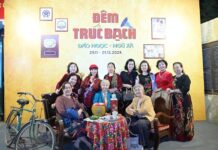The survey trip aims to introduce travel businesses to new places with potential for tourism development such that they will launch tours to these places, and collect their opinions in order to stimulate the province’s hospitality sector.
On the first day, we visited several sites in Kien Luong District, including the islands of Hon Nghe and Ba Hon Dam in Kien Luong District. The participants showed much appreciation and interest in the beautiful and pristine natural landscapes of the two sites.
It takes 45 minutes to travel by speed boat from Ba Hon in Kien Luong District to Hon Nghe Island.
Arriving at Hon Nghe Wharf, we toured Lien Ton Co Tu Pagoda and admired the 20-metre tall statue of Quan The Am (Avalokitesvara Bodhisattva), which was built in 1974 on the top of Lau Chuong Mountain.
The 20-metre tall statue of Quan The Am (Avalokitesvara Bodhisattva).
Lau Chuong Mountain is home to many magnificent and splendid limestone caves. From the top of Lau Chuong, we climbed down along the northern side and then scaled a vertical cliff to reach Gia Long cave. The seal of Emperor Gia Long (1762-1820), who founded the Nguyen Dynasty – the last in the history of Vietnamese feudalism, can be seen clearly on the cliff in the cave.
Known as the “kingdom” of cage fish farming, Hon Nghe Island has the largest number and greatest productivity of caged fish of the islands in Kien Giang.
Cages for fish farming at Hon Nghe Island
Leaving Hon Nghe Island, we headed to Ba Hon Dam, which is a group of three islands, namely Dam Duong, Dam Duoc and Dam Gieng. The three islands form a triangle when they are seen from above. Due to the shallow waters in the area, tourists can just paddle to hop from one island to the other without using boats.
Covering an area of about six hectares, Dam Duong island is surrounded by white sand strips. A part of the island has been designated for planting fruit trees such as sapodilla, longan, mango, jackfruit, and coconut. Visitors to Dam Duong are treated with fresh seafood while admiring the sea.
Hon Dam Duoc has an area of about 12 hectares and is covered by mangroves. An accommodation painted with glittering colours and equipped with spacious interior was recently established on the island, offering vacationers savoury dishes such as sour fish soup, fish porridge, and grilled crab.
An accommodation painted with glittering colours and equipped with spacious interior was recently established on Hon Dam Duoc island.
Meanwhile, Dam Gieng Island attracted us with its pristine nature and long sand beaches. There is a natural well in the island, which is full of water all year round.
On the morning of the second day, we took a 30-minute speed boat from Ha Tien City to Hai Tac (Pirates) Archipelago, which boasts more than 18 islands with a total area of 250 hectares.
There are many mysterious stories telling that the archipelago was once a shelter for pirates, with the most infamous gang having been ‘Canh Buom Den’ (Black Sail), after they robbed merchant ships passing Ha Tien – Rach Gia Bay.
Although tourism services have not yet fully developed in the archipelago, there are budget and comfortable facilities for visitors to stay, where they can join local fishermen to go fishing, cook, and learn about indigenous culture.
Hai Tac is also an ideal place for holiday-makers to sunbath amid the pure and fresh atmosphere of the sea.
Dong Ho lagoon faces To Chau Mountain to the right.
In the afternoon, we headed to Dong Ho Lagoon, which covers an area of nearly 1,400 hectares in the south of Ha Tien Town. The lagoon faces Ngu Ho Mountain to the right and To Chau Mountain to the right. It is a famous tourist attraction in Ha Tien, particularly in full-moon night when the moon casts its sparkling shadow on the water surface.
We then moved to Lam Cuong Ecological Tourist Site in Dong Ho Ward, where we rested in thatched tents and chilled in the green space of trees.
Birds flew back to their nests in the evening.
The next stop was the stork garden with a natural area of about 20 hectares, which is the habitat of a variety of birds such as stork, cauldron, and heron. There, we admired the exciting moment when birds flew back to their nests in the evening.
Our day ended up with a cosy diner at Canh Buom (Sail) Restaurant, where its owner Nguyen Van Hanh treated us with his most-rated dishes including jellyfish and shrimp salad, fish paste, pickled papaya, fried octopus, braised fish, and fish hotpot.



.jpg)
.jpg)




